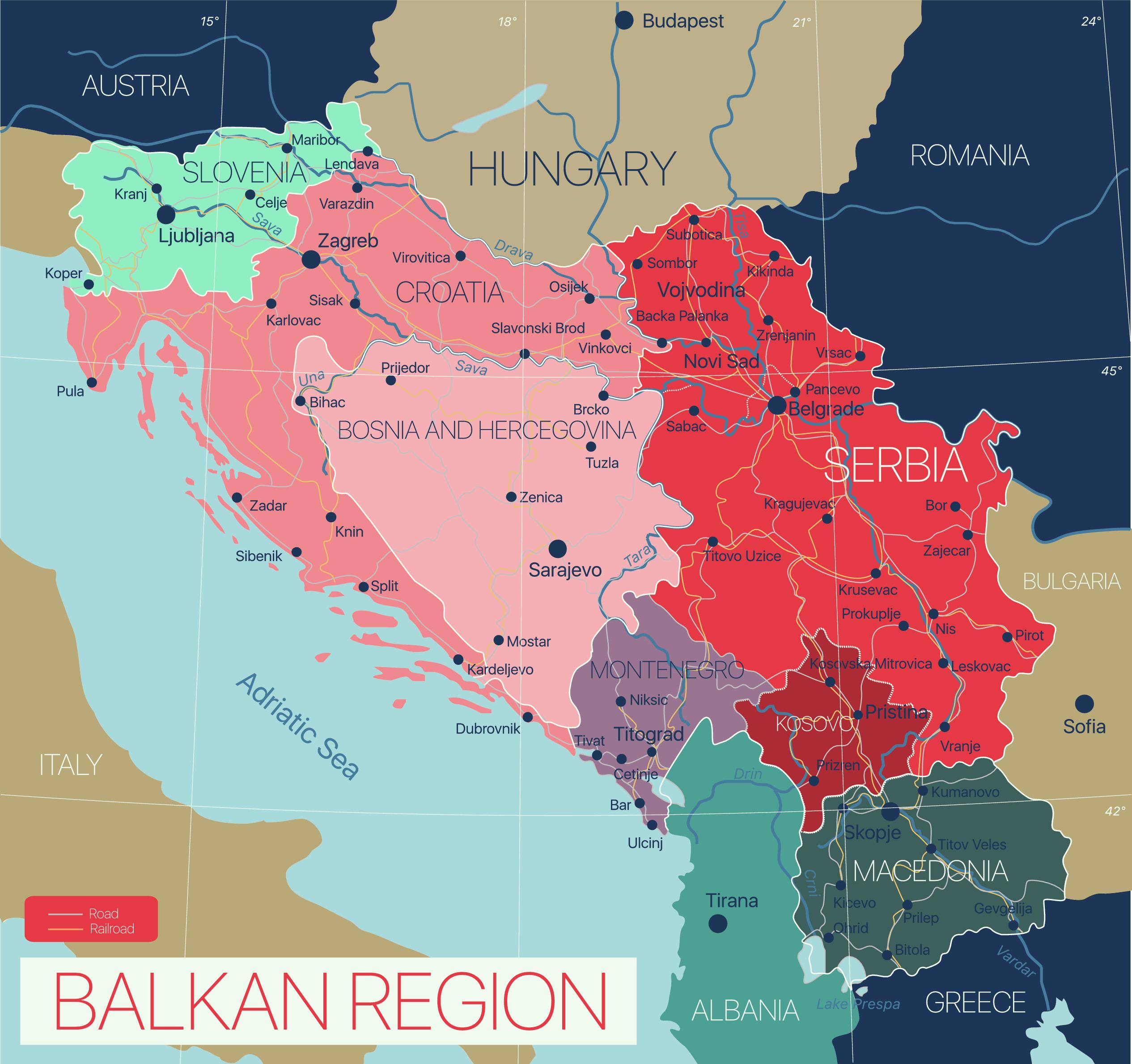Analysis of Hybrid Threats in the Western Balkans: Implications for Slovakia
Jan Cingel, Ivan Iliev, Samet Shabani, Lenka Semančíková, Alexandra Tóthová
The Western Balkan region has always been a place of political clashes between the external powers trying to gain more significant influence within the region. Besides the economic and business opportunities, the region’s attractiveness lies within its strategic geographical position and connectedness with the European Union. While the Western powers, notably the EU, aim to stabilise the area in its immediate vicinity, economically develop the region and transfer its values and democratic practices via the integration and accession process. At the same time, we witness substantial attempts by mostly autocratic or undemocratic states, such as China, Russia, and Turkey, to obtain their share of regional influence or entirely replace the West’s position. Unlike the other state actors, these demonstrably tend to affect politics, undermine democracy, and destabilize the region to fulfill their geostrategic ambitions and significantly impair the role of the EU and other democratic actors within the area. To pursue their goals, they often use hybrid methods to affect decision-making, boost their influence, gradually disrupt the political system, and undermine democratic practices in their favor.
Regarding the hybrid threats landscape, besides the active presence of foreign state actors, local non-state actors do not lag behind either in their activities considered hybrid threats which jeopardize the stability of the Western Balkans. Among non-state actors might be included a range from individuals to private organizations, religious institutions, extremist groups or armed groups. Whether it is a foreign state or non-state actor, their activities, such as spreading disinformation, undermining democratic principles, cyber-attacks, and influence operations, lead to the polarisation of society, affect the elections and referenda results or hinder the progress in the EU integration process. In addition, hybrid threats and their actors are constantly evolving. Thus, the presented analysis reflects the activities of these actors and the mutual relations between them mostly during 2022.
As implied above, the study discusses current challenges and the prominent trends related to hybrid threats and their occurrence in the Western Balkan region. It primarily analyzes actors, their mutual relation and tools, methods and forms coupled with hybrid threats and influencing decision-making. Simultaneously, it analyses hybrid threats targeting society to influence public opinion, weaken the public’s trust in democratic institutions and deepen inter-ethnic polarisation within the region. The final study comprises interviews with numerous experts from all six Western Balkan countries: Albania, Bosnia and Herzegovina, Montenegro, Serbia, North Macedonia, and Kosovo. The study aimed to provide a reader with detailed insight into hybrid threats in the region of strategic importance for the EU and Slovakia. The presented study might enable more effective recognition and prevention of hybrid threats, which is crucial when combating them. The project, including the presented study, was implemented with the financial support of the Ministry of Foreign Affairs and European Affairs of the Slovak Republic.
Hybrid Threats of a Foreign Origin
Concerning the hybrid threats of foreign origin occurring in the Western Balkans, the study analyses the influence and activities of the three most relevant undemocratic states operating in the region, particularly Russia, Turkey and China. The trend had further expanded since February 24 last year, when Russian troops attacked Ukraine. Since then, the region has undeniably turned into an imaginary geopolitical battlefield between non-democratic regimes and the politics of the West. While these countries have long been considered partners in the region, every day, it becomes more evident that their activities deliberately harm the stability of the Western Balkan countries, disrupt the democratic structures and, finally, hinder their ambition to join the EU and NATO. Along with their harmful practices employed to gain more influence, they contribute to the polarisation of society based on ethnic and religious differences, leading to the rise of hostility between individuals, ethnic and religious groups and, after all, between neighbouring countries.
According to the study, Russia has emerged as one of the most influential and, simultaneously, the most harmful foreign actor operating in the Western Balkans. Its decisive role might be explained by strong historical, cultural and religious ties between Russia and the WB region, constantly pushing the region to the centre of Russian interests. It mainly concerns Bosnia and Herzegovina, Montenegro, Serbia and North Macedonia and those territories where the Serbian population prevails. Contrariwise, the most negligible influence of Russia was recorded in Albania, where pro-Russian sentiment is almost absent, mainly because of contrasting views on the issue of Kosovo. The primary motivation for Russian presence and incurring costs to influence local politics and society is the concern about its gradual political, economic and military ejection from the region by the expansion of NATO and the EU structures. Last but not least, Russia also pursues its economic and energy interests, specifically to maintain its energy raw materials outlets. As a result, Russia’s well-established position in the region through its cultural and historical ties, the energy dependence of the region, and solid pro-Russian sentiment allow the country to push their interests forward stealthily.
„The region has undeniably turned into an imaginary geopolitical battlefield between non-democratic regimes and the politics of the West. While these countries have long been considered partners in the region, every day, it becomes more evident that their activities deliberately harm the stability of the Western Balkan countries, disrupt the democratic structures and, finally, hinder their ambition to join the EU and NATO“

Fake news and troll factory. Figures at the computer on the Russian flag. Photo: Shutterstock.com
Furthermore, Russia supports practices undermining democratic principles, including the rule of law, such as (strategic) corruption and non-transparency. Hence, it deliberately reduces the countries‘ chances of obtaining EU membership. Simultaneously, Russia backs several nationalist and extreme right-wing groups in their attempts to polarise society by spreading conspiracies, fear, and, finally, hatred among ethnic and religious groups. Especially aftermath of the outbreak of the war in Ukraine, Russia has become more active while attempting to change narratives in its favour, primarily through its hybrid tools and proxy and disinformation actors. Significant pro-Russian sentiment and distrust towards the West, mainly occurring within the Serbian part of the population, significantly facilitates the spread of Russian propaganda and disinformation campaigns. Besides endeavouring to influence public opinion and politics, Russia utilises another hybrid threat – cyber-attacks. In this context, the study showed that the region is susceptible to cyber threats as it lacks sufficient capacity to secure state infrastructure. The analysis also demonstrated that Russia’s most important partner is Serbia since Russian activities in the country are not even perceived as a hybrid threat. However, Bosnia and Herzegovina seems to be the most vulnerable among all six countries, as there is a real danger that Russia will succeed in destabilising the country by bolstering support for Republika Srpska’s secessionist tendencies.

China High-Resolution War Concept. Photo: Shutterstock.com
Likewise, China tends to be perceived rather as a partner than a hybrid threat. Although it appears a less ‚aggressive‘ actor, its activities are no less dangerous for the region from the medium and long-term perspective. The influence of China has notably advanced in the past 20 years, along with expanding its economic activities and investments in the military and critical infrastructure as well as projects supporting culture, education, and media. Unlike the EU, China does not require strict rules while implementing its projects and investments. Thus, it is a faster and easier way to advance. Consequently, China has become seen as a potential alternative to the EU. Although China has substantially invested in building critical infrastructure, this financial support is not selfless or for free. Conversely, it is based chiefly on loans conditioned by the handover of part of the country’s critical infrastructure to Beijing in case of non-payment. In addition, Chinese investment projects often lack transparency and do not follow European rules and standards. Overall, China is considered the most silent hybrid threat, which has earned quite an influential position in the region.
Turkey is the most questionable actor when speaking about hybrid threats. First, Turkey has a natural ground for interest in this region due to several factors, such as a shared past, upheld social, economic and diplomatic relations over the years, its perception as a strategic partner, and the neighbouring geographical location. Before the rise of Erdogan’s AKP, Turkey’s vision of the WB’s future corresponded to the EU’s views. At the same time, Turkey significantly contributed to the state-building process in the WB countries and assisted in their democratic transformation by providing institutional capacities. The closer partnership was developed upon military support and a common strategic goal, namely the accession of WB countries to the Euro-Atlantic Defence Pact. Compared to Russia and China, Turkey has considerably limited resources; however, it can rely on its „soft power“ and influence resulting from close social and cultural ties with the region. Besides that, Turkey is accessible to communities and tends to build close relationships with people. As indicated, Turkey is also trying to be a direct and sincere partner of political elites regarding their interests, expectations, and requirements. Therefore, Turkey does not have to carry out hybrid activities with potential security implications since Turkey as a strategic partner, may make demands directly through the institutional framework. However, the Turkish government has been increasingly influencing policymakers in the region, thus paving the way for hybrid activities in the area.
Engagement of Non-State Actors in Hybrid Threats
The non-state hybrid threats represent an equal risk for the region as those of foreign state actors. Simultaneously, many non-state actors engaged in hybrid threats are directly supported by state actors who benefit from their actions while assisting them in pursuing their regional strategic goals. However, as the study revealed, non-state actors are, in several cases, not only tolerated but also supported by the local state authorities. For this reason, the authors believe that the current fight against non-state hybrid threats in the Western Balkans region is limited and insufficient, and the so far proposed solutions do not address the actual source of the problem (social contradictions, inter-ethnic tensions, discrimination of minorities, inter-religious animosities), based on which these actors get opportunities to employ their hybrid methods.
Generally, hybrid threats by non-state actors vary from country to country. However, regarding the specifics of the given region, they could be clustered into four main categories: organized crime, religious-based extremism, nationalist and far-right extremism (including hooligans) and political extremism mainly represented by far-right political movements and parties. While religiously motivated extremism poses a threat, namely in Albania, Kosovo, Bosnia and Herzegovina and North Macedonia, as it is mainly linked to Islam, in countries such as Serbia, Montenegro and North Macedonia, it is nationalist and far-right groups and political movements that take over the role of guardians of traditional and religious values. At the same time, the experts agree that the most severe threat of non-state nature to Albania is currently organized crime. However, it must be noted that also Kosovo struggles with a strong influence of criminal groups. Yet, in Albania, these groups have reached the level of power which allows them to endanger constitutional order and the rule of law and influence political decisions in the highest places. According to the majority of interviewed experts, the vulnerability of the Western Balkan region to hybrid threats predominantly lies in its multi-ethnic and multi-religious nature, which makes it a good target for various state and non-state actors who attempt to disrupt the system to strengthen their position.
Conclusion
To conclude, despite the Euro-integration ambitions of the region, it is also attracted by autocratic powers trying to replace the influence of the West and undermine its geostrategic interests. These foreign state actors seek to destabilise the region to fulfil their foreign policy ambitions, often contradicting the EU’s and NATO’s values and interests. As the study shows, the Western Balkan countries lack sufficient capacities to combat and prevent the hybrid threats they face regardless of their origin. Moreover, as revealed, the local authorities and institutions often do not show the will to recognise and defend against these hybrid threats; instead, they directly support them. Delaying the perspective of the EU membership further paves the way for hybrid threat actors, simultaneously reducing credibility and worsening people’s perception of the West.
Authors of the research paper on behalf of the Strategic Analysis Think Tank:
Jan Cingel, Ivan Iliev, Samet Shabani, Lenka Semančíková, Alexandra Tóthová
Author of the English summary:
Romana Burianová
Author of the graphic design:
Petra Bošková
The project was supported by the Ministry of Foreign and European Affairs of the Slovak Republic.
The views, ideas and assessments presented in the research study or this summary are only those of the authors from the Strategic Analysis Think Tank and do not necessarily reflect the official positions of the Ministry of Foreign and European Affairs of the Slovak Republic or the official Slovak foreign policy.


Contact us